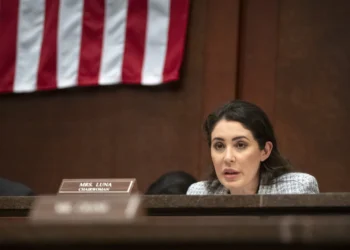Christian social media was stunned when Fixer Upper darlings Chip and Joanna Gaines revealed the cast of their new HBO Max series, Back to the Frontier. Among the three families heading back to the 1880s life is a same-sex male couple raising surrogate-born twin boys.
Other than the matching rugs in my kitchen and dining room, I’ve had little connection to the world of Magnolia. But I knew they were supposed to be the stand-out Christian stars — refusing to compromise or lash out when their pastor came under fire in 2016 for defending biblical marriage. So I assumed the gay pair was some kind of oversight. Maybe rogue producers snuck the couple in, or casting did a switcheroo.
Nope.
Chip’s promo post on X made clear this was intentional: “Y’all are going to love this show!! Social experiment + family time well spent.” Social experiment indeed, just not the kind that resonated with his evangelical fan base. When the backlash came, he didn’t apologize or acknowledge the conflict with biblical convictions. Instead, he responded with, “Talk, ask qustns, listen… maybe even learn. Too much to ask of modern American Christian culture. Judge 1st, understand later/never.”
Then came video of the two men, Joe Riggs and Jason Hanna, describing their casting process. HBO’s recruitment materials openly featured a same-sex couple. Recognizing themselves as the perfect fit for the Gaines’ vision, they applied, hoping to “normalize” gay couples. Queering the frontier had been the plan all along.
The online backlash wasn’t primarily directed at the gay men. It was aimed at Chip and Joanna themselves. How could this couple — beloved for their professed faith and family values — slide so far?
The same way many Christians do.
How the Faithful Fall
As is so often the case, the compromise was personal. The Gaines’ long-time photographer is a man subjecting his five children to a gay/polyamorous household, and remains in their employ and has been publicly affirmed by Joanna. They validated him and his choices, and are now becoming like him. In a 1 Corinthians 15:33 adaptation, one youth pastor I know tells his students, “Show me your friends, and I’ll show you your future.”
That’s not just true for kids. When those in our innermost circle openly defy God’s righteous decrees and we offer no objection, we take the first step down a slippery moral slope. The bottom of that slope is often full apostasy. Because if you cannot trust God’s verifiably objective and beneficial standards concerning gender, sex, and marriage, why would you trust the harder to verify claims like the resurrection, virgin birth, and his promise to come again to judge the living and the dead?
The Gaines aren’t the first Christian icons to slip from their built-on-solid-rock foundations. Jen Hatmaker, Joshua Harris, and even renowned theologian Richard B. Hays (whose son co-authored a 2023 pro-gay book with him before his death) all traveled the same downward slope allowing relationships to shape their theology. They arrived at a place where, on issues of gay relationships, they believe themselves more loving than God.
And it’s not just celebrities.
In my 30 years of ministry, I’ve seen pastors, small group leaders, BSF teachers, and decades-long faithful pew-sitters begin to slide almost always because someone close to them identifies as LGBT. Whether it’s a child, sibling, neighbor, or friend, the ultimatum is clear: affirm me, or affirm God’s truth. You have to choose.
Too often, Christians choose the affirming people option because they’ve been shaped by a watered-down theology that reduces the gospel to “love God, love people.” They let Matthew 7:1 (“Judge not…”) override Romans 1, which not only condemns 25 forms of rebellion but also warns that God’s wrath extends to those who give approval to those who practice them. In the name of preserving the relationship, they forfeit the truth.
This is the pattern. Over and over. Someone “comes out,” and soon the family member’s theology bends to accommodate their relationship. But biblically, the exact opposite should be true. We’re called to love, but never to affirm sin. In fact, we often love them by condemning the sin.
Yes, biblically loving our LGBT neighbors will inevitably result in relational friction. But when friction arises, Scripture repeatedly warns us to be the influencers, not the influenced. God calls us to be in the world, but never of it. Our theology is not to be conformed to our daughter’s new gender identity, but our mind (and by extension hers) is to be transformed by the reality that God made us male and female.
Kindness to Adults, Cruelty to Kids
In a pride-obsessed world, faithful Christians will face trouble. But take heart, you can overcome the world. But if you refuse to, children pay the price.
The place where we are seeing the most disappointing compromise from Christians today is on matters of sex, gender, and marriage. Refusing to comply with LGBT ideology will exact a relational cost. Enter theological wolves like Matthew Vines and Father James Martin who offer what looks like a solution: a version of Christianity that affirms LGBT identities while claiming to remain faithful to Scripture. For Christians trying to placate LGBT friends or family, it feels like a win-win: social approval without outright apostasy.
But it’s a mirage. Their teachings on sex and marriage give believers biblical cover to avoid the necessary discomfort of truth-telling. They redefine compromise as compassion and affirmation as love. Yet kindness that contradicts God’s design is not kindness at all. When Christian adults refuse to pay a short-term social cost, we force children to bear a lifelong cost.
Why is that? God’s design for marriage aims not only at childbearing but child flourishing (Malachi 2:15). From Genesis to Revelation, He insists on a male-female, lifelong, exclusive union. God did not conjure up a marital relationship that was complementary, permanent, and exclusive out of thin air. He devised this structure because each of those marital distinctives has a critical child-specific benefit.
Marriage is complementary — one man and one woman — because moms and dads offer distinct and critical contributions to child development.
It is permanent — till death do us part — because children need their mother and father for their entire lives. When that union fractures, kids suffer physically, emotionally, mentally, academically, and relationally.
It is exclusive — no infidelity — because the presence of unrelated adults in the home dramatically increases risk of abuse and neglect. The most dangerous place for a child today is in the home of an unrelated man.
Whether it’s cohabitation, easy divorce and remarriage, polyamory, or platforming a same-sex household in a national TV show, compromise on marriage always harms children, or normalizes the kind of family structures that will.
That is a no-go zone for Christians. Child protection is not optional for the church. For two millennia, our public witness has elevated the rights and well-being of children. Compromise on God’s design for marriage does the opposite. It puts children at risk. That’s millstone territory.
The Gaines fell for a trap that ensnares many Christians: allowing relationships to bend our theology. God has long warned us of this relational enticement. Should our friends force us to choose, we must elevate truth over relationships. When our theology bends to personal connection, it breaks the very truth that sets people free and protects the least of these.
This isn’t just about the Gaineses. It’s about every one of us facing the quiet pressure to exchange truth for acceptance. Faithfulness requires courage. But our children, our witness, and our souls are worth the cost.














